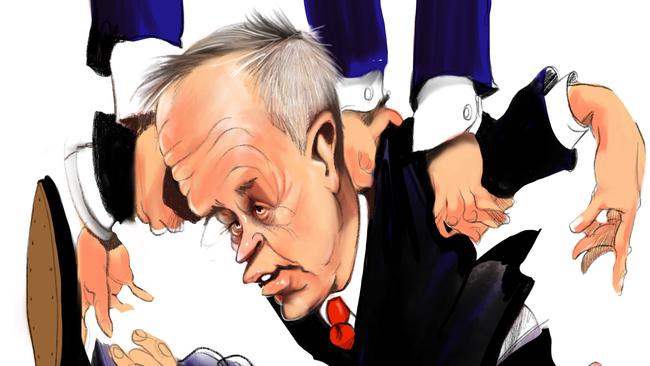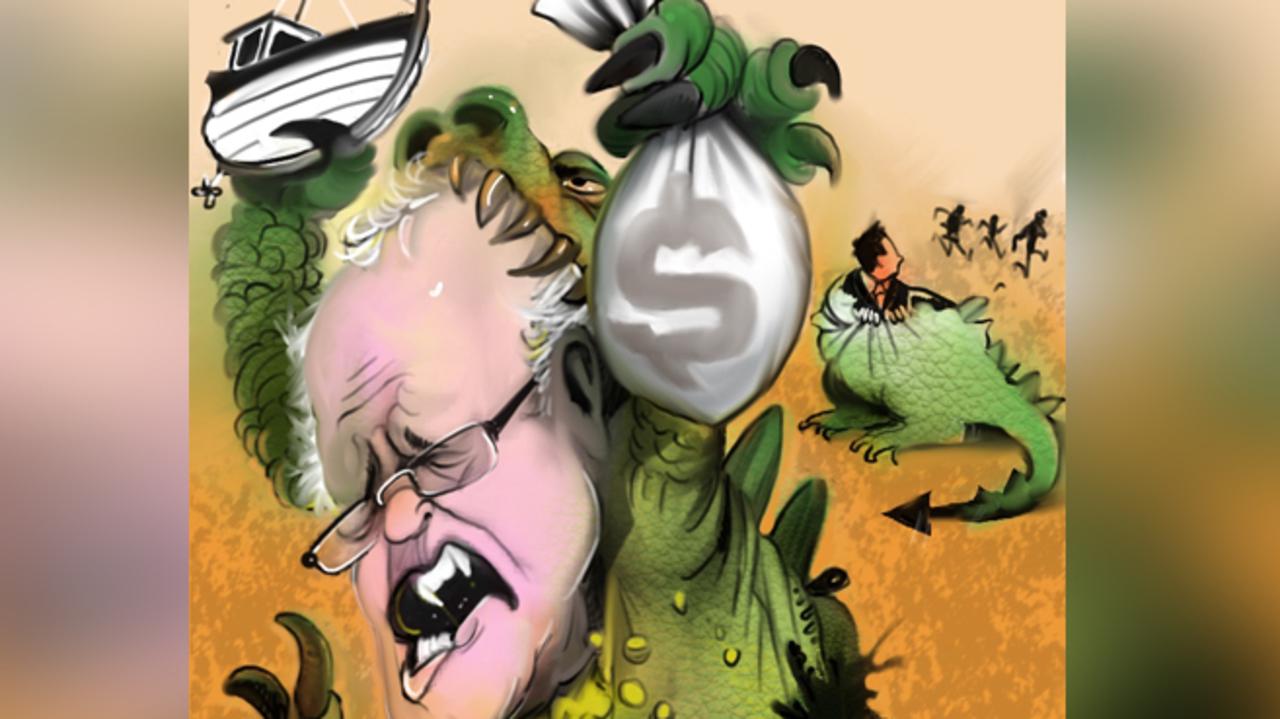Bill Shorten gets a leg-up again as conservatives unravel

Fresh from being upstaged by Kristina Keneally, a recruiting coup he could live to regret, a bright-eyed and bushy-tailed Bill Shorten faced the media in Melbourne on Monday morning.
Labor had just copped a shellacking at a by-election in his home state, losing a seat it had held for 90 years to the Greens. OK, it was a state seat, but it was emblematic of the existential crisis facing major parties: Labor from the Greens, and Liberals from One Nation and a gaggle of conservative parties.
Yet the media decided the sexier story was the push by two Nationals, Barry O’Sullivan and George Christensen, for an inquiry into the banks. It was no surprise to see Labor’s agenda pushed by conservative government MPs in what smelled mightily like a hostile payback on same-sex marriage, so furious were they with Dean Smith moving swiftly to introduce his marriage equality bill. Heated exchanges in the Senate alcove over Smith’s actions, hastily arranged meetings of disgruntled conservatives where they vented about the alleged inaction of Mathias Cormann and Peter Dutton, led to flurries of headlines about Scott Morrison intervening to sort it, thereby burnishing his credentials as peacemaker.
Much of it sounded like shocked losers were having trouble coming to terms with the maths, then striking out to show on another front how little difference there was between the majors.
“Apart from ties to trade unions, what separates us from Labor?” one exasperated senior Liberal MP asked last week. Well, unity for one thing.
Although the Opposition Leader would have had a blah blah answer ready to go about it being a shame, it was state stuff and it was important for him to stay in tune with what really concerned the voters, blah blah, not one journo all that day — or since — thought it worth asking about a more than 10 per cent swing against his party.
He also could have been asked, given his gripe the previous day that criticisms of Keneally’s record were misogynistic and in light of repeated lectures from Labor men and women on the need for respect on matters relating to gender and sex, what he thought about Victorian Health Minister Jill Hennessy mistakenly sending a text to her Deputy Premier, James Merlino, calling him a “c” because he had been fighting to prevent Victoria from enacting laws that would give it a licence to kill its own citizens. Hennessy should have been out on her “b” but after apologising privately to Merlino the story disappeared. No Liberal would have got off so lightly. It was ever thus.
Everywhere he turns, someone is waiting to give Shorten a leg-up. First the leg-up from the Nats on banks, second the leg-up from the journos, then a third leg-up from Christopher Pyne announcing a new sitting schedule for the lower house, which scored a remarkable trifecta of own goals with a single strike.
It fortified the narrative of Canberra chaos, fed the perception that Malcolm Turnbull was frightened of his own backbenchers, and clouded his attempt to shift the focus back on to the economy with a pledge to cut personal income tax cuts.
Labor probably would have succeeded in spinning it as a clever tactical ploy, dismissing claims of trashing democracy as trash talk, but in the fetid atmosphere surrounding conservative politics it was another debacle.
Shorten has shifted leftward to counter the Greens, without too many internal challenges and with some temporary success in federal inner-city seats. Coalition MPs, with threats of floor crossings and defections, have found blackmail is a handy tool to force Turnbull to bend to their will.
Neither Shorten nor Turnbull can afford to go as far left or as far right as their adversaries, or in the Prime Minister’s case wherever the panic-stricken agrarian socialists or hardline conservatives demand regardless of logic or political realities. The same-sex marriage postal ballot was worth every cent of the almost $100 million spent on it for what it showed us about ourselves: primarily that middle Australia still exists; it is still a majority; it leaves the wars on culture and values to the warriors on the outer edges; it will vote for change if it’s fair; then, having voted, will want politicians to get it done and, like them, get on with other things.
Defeat truly madly deeply shocked several conservative MPs who had believed they could win the campaign, spurring them to search for new causes to mark out their territory.
Progressives marvelled at the irony that the bulk of the No vote from places such as western Sydney could only have been from people Australia’s hard right has maligned at every opportunity or insisted be turned back at the borders. Before she campaigned against Muslims, Pauline Hanson feared Australia would be swamped by Asians. Social conservatives who target such minorities now find themselves on a unity ticket with them on family values, demanding religious protections that could open the door to sharia law. And while on droll ironies, those on the left who defend the same minorities need to reflect that on this and other matters — such as the treatment of women — they are not allies and that perhaps measures to induce them more into the mainstream, particularly with tougher citizenship tests, are not a bad idea.
But right now the right is splintering faster and more viciously than the left. The sheer will and determination of a few hold the Turnbull government together. Pledging tax cuts was an attempt to show the government had resumed core business. If the remainder of the company tax cuts are rejected by the Senate, the money saved, plus more, will be converted to income tax cuts, spread out into the next term. Senior ministers, muttering they wished business had campaigned as hard for their tax plan as it did for same-sex marriage, are reluctant to spend any more capital trying to sell the unsellable.
If their efforts fail the government will disintegrate and so will whatever semblance of unity remains. Based on the reaction to the same-sex marriage vote, although it had been canvassed privately even before that, there is a real fear the Liberal Party will split in opposition.
If any Liberal in the aptly named coward’s castle, or a Nat who fancies himself a modern-day John McEwen capable of vetoing liberal leaders, defects to destroy Turnbull, it would guarantee defeat and precipitate a fracture. Hopes of a Tony Abbott revival, because he is a better campaigner in general and on conservative values in particular, have been shattered by the same-sex marriage vote, and nowhere more so than in his own back yard.
What then? It is not too far-fetched to imagine Andrew Hastie as leader of the new conservative liberal party and Tim Wilson as leader of the new progressive liberal party. But that’s a long way off and will depend on who is left to pick up the fragments.



To join the conversation, please log in. Don't have an account? Register
Join the conversation, you are commenting as Logout